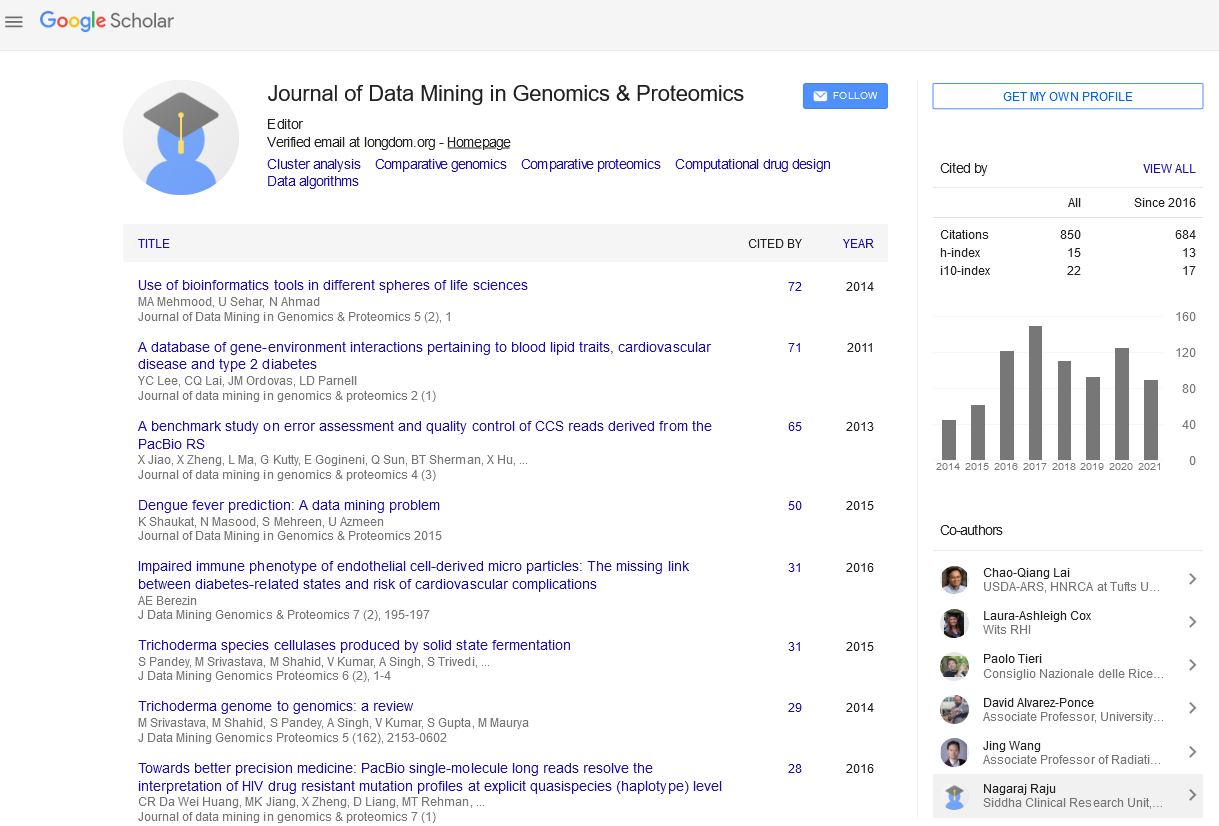PMC/PubMed Indexed Articles
Indexed In
- Academic Journals Database
- Open J Gate
- Genamics JournalSeek
- JournalTOCs
- ResearchBible
- Ulrich's Periodicals Directory
- Electronic Journals Library
- RefSeek
- Hamdard University
- EBSCO A-Z
- OCLC- WorldCat
- Scholarsteer
- SWB online catalog
- Virtual Library of Biology (vifabio)
- Publons
- MIAR
- Geneva Foundation for Medical Education and Research
- Euro Pub
- Google Scholar
Useful Links
Share This Page
Journal Flyer

Open Access Journals
- Agri and Aquaculture
- Biochemistry
- Bioinformatics & Systems Biology
- Business & Management
- Chemistry
- Clinical Sciences
- Engineering
- Food & Nutrition
- General Science
- Genetics & Molecular Biology
- Immunology & Microbiology
- Medical Sciences
- Neuroscience & Psychology
- Nursing & Health Care
- Pharmaceutical Sciences
Breast cancer mutations linked to viral infections
2nd International Conference on Big Data Analysis and Data Mining
November 30-December 01, 2015 San Antonio, USA
Bernard Friedenson
UIC College of Medicine, USA
Posters-Accepted Abstracts: J Data Mining Genomics Proteomics
Abstract:
Multiple risk factors for breast cancer are well known but understanding what actually causes the disease has been daunting. The idea that viruses cause breast cancer has fueled a long standing controversy. The present work found breast cancer mutations damage genes crucial for viral immunity. Multiple viruses therefore can potentially cause breast cancer depending on the condition of the immune system. Slow growing or dormant cancers may suddenly become aggressive if gene mutations have damaged immunity enough to allow a resident cancer virus to escape from control. To approach the causes of breast cancer, thousands of gene mutations in 21 different breast cancer genomes were analyzed in depth. Some gene mutations in every one of the 21 breast cancers directly impair immunity. Some critical part of antiviral protection is always disabled. The sets of mutated genes affecting immune responses are very different with only a few genes mutated in more than one breast cancer. Differences in which immune system genes are mutated represent a hidden variable in studies trying to determine whether a specific virus causes breast cancer because mutations can change susceptibility to some viruses. In at least one breast cancer, virtually all the 160 gene mutations that could be tested had direct or indirect relationships to viral infection. An abnormal or deregulated immune response could also contribute to breast cancer if there are other causes. Personalized breast cancer genomic information may improve effectiveness of vaccines, immune stimulation, antiviral and/or anti-inflammatory drugs in preventing or treating breast cancers.
Biography :
Bernard Friedenson is a Ph.D. research scientist with over 50 publications. He received an NIH career development award and an Innocentive award in competition with nearly 400 other scientists. After a B.A. in honors chemistry-mathematics at the University of Minnesota Duluth and a Ph.D. in biochemistry-organic chemistry at the University of Minnesota, he did post-doctoral work at Roswell Park Memorial Institute, where he rose to senior cancer research scientist, specializing in immunology. At UIC, he acquired 13 years further training in medical sciences and molecular biology. He is a member of the editorial board of BMC Research Notes.


